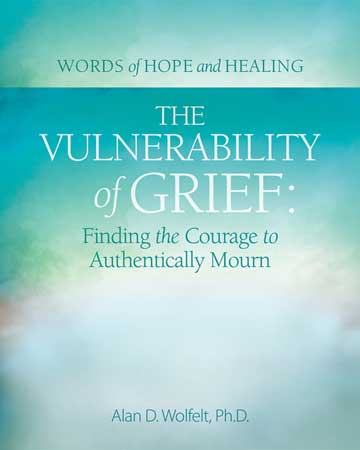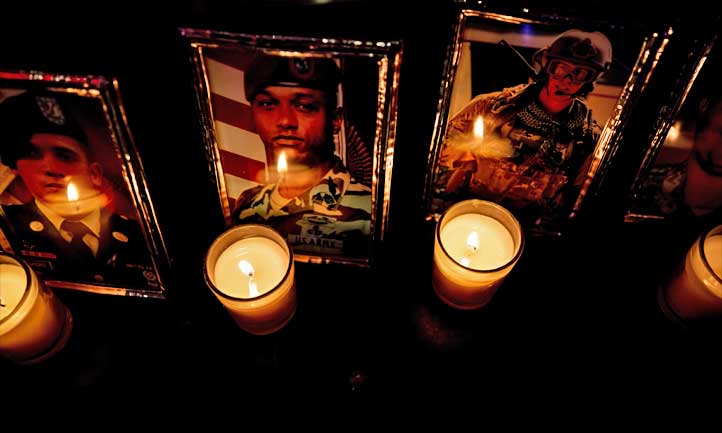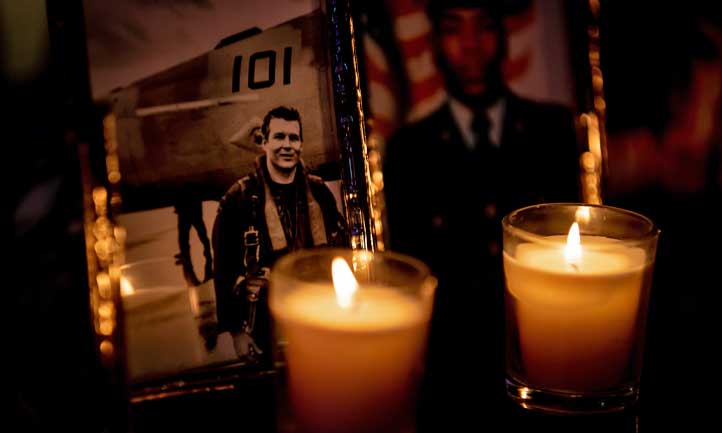Embracing Your Vulnerability During the Holidays
Author: Alan Wolfelt
Grief, the holidays, and vulnerability naturally go together because when someone in our lives dies, the holidays — and all the nostalgia they bring — can heighten our feelings of vulnerability.
Being vulnerable is the opposite of protecting ourselves because when we protect ourselves, we create barriers and shields that safeguard us from harm. Common emotional shields are things like denial, secrecy, disengagement, and mutual pretense — where I know something, and you know something, but we don’t acknowledge it. When we allow ourselves to be vulnerable, though, we consciously lower those shields.
Further, when we mourn — or express our grief outside of ourselves, we’re turning ourselves inside out, exposing our soft inner selves to the outside world. We’re sharing our deepest, most tender feelings — our truths. Of course, invitations to both grieve and mourn are naturally going to occur during the holidays. While some people will probably encourage us to be strong this time of the year, it’s actually a time to surrender to vulnerability. That’s because vulnerability is fundamentally about honesty and connection — it’s about being authentic. If mourning in any way is going to be integrated into our lives, we have to be authentic and truthful about how losses impact us.
Let’s explore eight principles that invite vulnerability in for the holidays.

This article is adapted from Alan Wolfelt's book: The Vulnerability of Grief: Finding the Courage to Authentically Mourn.


Eight Principles That Invite Vulnerability
If something is concerning you, weighing on you, or just making you feel stuck, it’s teaching you that it needs and deserves your attention and expression. The thoughts and feelings of grief have a purpose: to help you make the essential transition from life before the loss to life after the loss. Your most vulnerable, difficult thoughts and feelings are probably the most important ones to encounter, embrace, befriend, and familiarize yourself with. They’re often the most meaningful to you, so watch for them, welcome them, and give them a voice as they naturally arise during the holidays.
If you like to put pen to paper, think about writing down the many thoughts and feelings that arise during the holidays. If it’s a good match for you, writing things down can help you clarify whatever you’re experiencing. With the help of your pen, you’re taking your grief and allowing it to become authentic mourning.
Try talking to your most empathetic, caring, nonjudgmental friend about some of your grief-related feelings during the holidays. Allow yourself to tell them one thing you may even be afraid to express out loud, then see how they respond. After you express this one thing and even spend a few minutes exploring it with your friend, take inventory of how you feel. Do you feel lighter — more relaxed? One small sharing experience often leads to more sharing. Vulnerability creates connection and invites self-compassion.
During the holidays, someone is bound to ask you this question. If you’re not careful, you respond by saying, “I’m OK. How are you?” It invites a clichéd interaction — they lie, you lie, we lie when we need to be authentic.
Consider a more honest, vulnerable response. If you’re struggling with low energy or inability to focus during the holidays — having brain fog, perhaps, which commonly occurs this time of year — go ahead and say that. Whatever is on your mind and heart, share at least a little bit of it. The more honest you are with yourself and those around you, the more movement can occur with your grief because you’re letting yourself authentically mourn.
Just as the Victorians wore black armbands when they were in mourning, wearing a symbol of some kind invites people to acknowledge the significance of your loss and support you in grief. An outward sign or symbol of your loss signals that you are ready and willing to discuss something deeply important to you. That’s life-changing. It will also show you who can be a source of support and who cannot.
Contrary to popular belief, you must go backward before you can go forward in grief. You're working to shift the relationship from one of presence to one of memory. During the holidays, we naturally think more about the history of the relationships we had with those who have gone before us and often review the circumstances surrounding the death. Set aside time during the holidays to go through photos, watch videos, and take a look at memorabilia that associates you with your loss. Sharing memories with a good listener can be a lovely way to listen to the music of the past so you can sing in the present and dance into the future.
When words are inadequate, have a ceremony. Grief rituals or ceremonies are among the most powerful mourning actions you can take, and the holidays are a great time to carry them out. While funerals are an example of a more formal grief ritual, you can create informal ways to make grief rituals part of your holidays by simply playing a certain song, reciting a prayer, or holding a linking object that connects you to the person who died. You could also walk a particular path or light a candle in remembrance.
During the ritual, you’re dedicating your time and attention to the loss. You’re acknowledging, thinking, feeling, remembering, honoring, and authentically mourning. This creates a sweet spot of vulnerability in the structure of the ritual.
It is challenging to ask for help, particularly in grief and especially during the holidays. Sadly, many people tend to see asking for and accepting help as revealing weakness or burdening others, yet we have to be vulnerable if we’re going to seek and be able to accept support. It means admitting that we aren’t fully self-sufficient.
Remember, mourning is literally a shared response to loss, so allow yourself to be vulnerable and accept the support you need and deserve during this naturally difficult time of the year. If you aren’t getting the support you need, it’s OK to ask for help. Give it a try and see what happens.
Practicing vulnerability in grief and in life is, in essence, the practice of sowing love — love for the people and things we’ve lost, love for ourselves, our friends, our family, and the world we live in.

This Season and Always
Your TAPS Family is your trusted source of support in every season of grief. Let our compassionate staff connect you with local resources, grief counselors, and TAPS Care Groups so you have the local support you need this holiday season and always. Visit our Grief Counseling page to for additional information on grief counselors in your community.
Dr. Alan Wolfelt is one of North America's leading death educators and grief counselors. He is the founder and director of the Center for Loss and Life Transition and a TAPS Advisory Board Member. Visit centerforloss.com to further explore the vulnerability of grief and view his wide range of publications for caregivers and grievers, including The Vulnerability of Grief: Finding the Courage to Authentically Mourn, from which this article is adapted.
Photos: TAPS Archives
